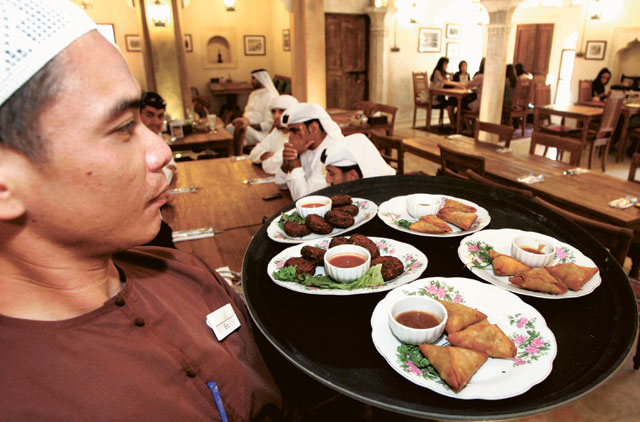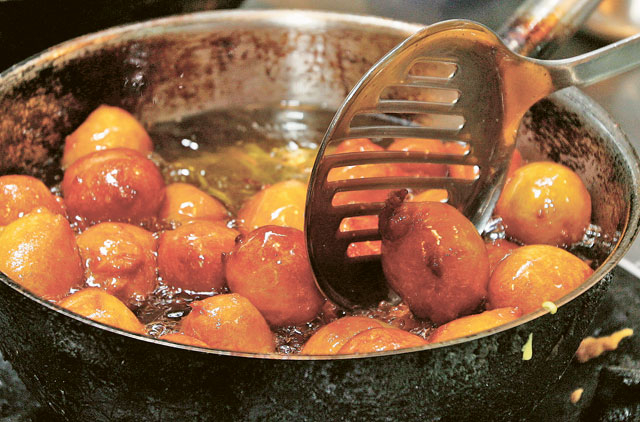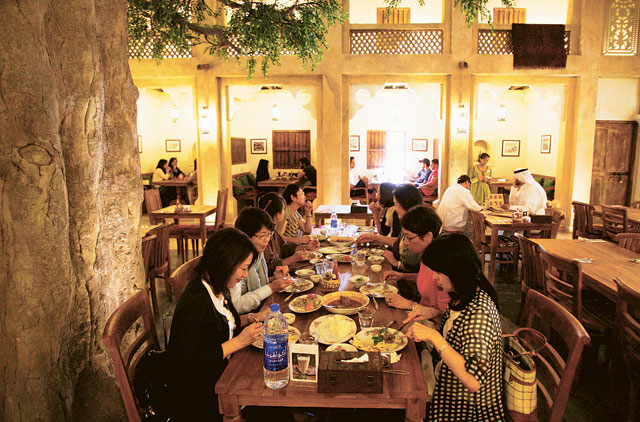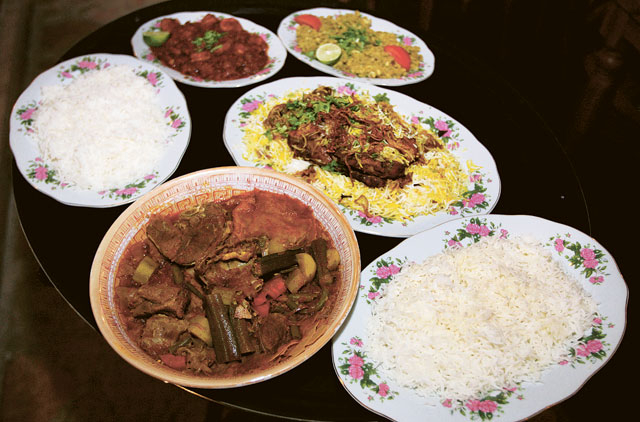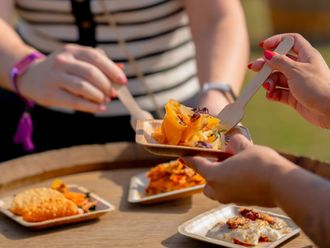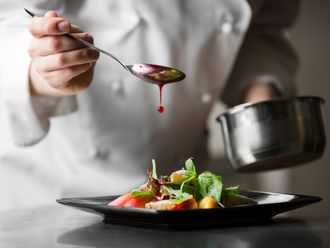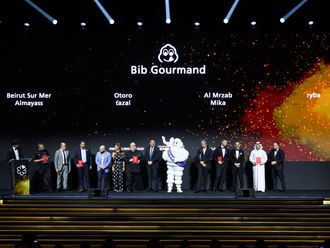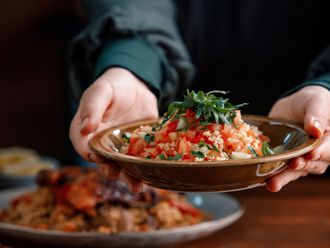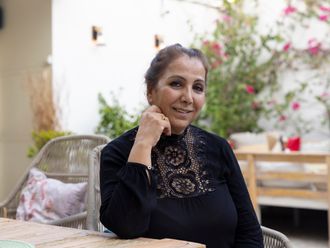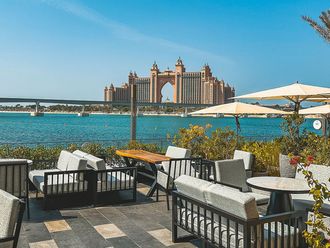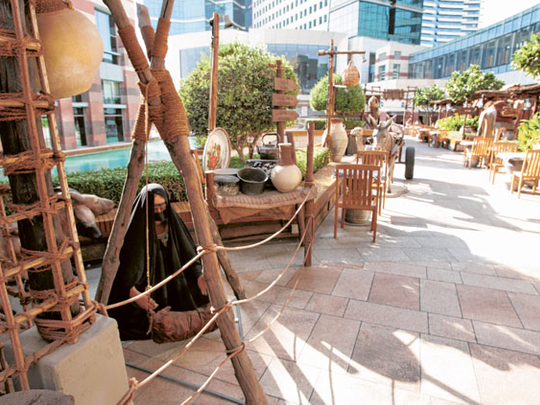
It's hardly breaking news to write that much of the UAE's expatriate population knows very little about Emirati food. The cuisine is, at its heart, homecooked, and so getting a taste of local dishes requires an invitation to dinner at someone's home, something not everyone has the opportunity to enjoy.
However, there is an increasing demand for Emirati cuisine, and restaurants are opening to meet it, although it's not necessarily expats who are most vocal about the need for more local restaurants. It's the Emiratis themselves.
"Life has changed. It is not as it used to be," sighs Hashem Marzouqui. The Emirati businessman is the founder of the newly-opened Al Fanar, an Emirati-cuisine restaurant at Dubai Festival City.
Fewer locals, he says, have the time or inclination to eat their own cuisine at home due to changes in lifestyle and attitudes. "When both the wife and husband work, they would either eat their main meal outside the house or would order food during the working days." And with few Emirati cuisine restaurants in Dubai — the take away-only restaurants mainly serve to cater large events — options for dining out inevitably turn to the huge variety of international cuisines that have charmed all of the UAE's residents.
Culinary treasure trove
So far, the majority of customers at Al Fanar, which is modelled after a tawash, or the traditional home of a wealthy pearl trader, are national citizens, says Marzouqui, but his restaurant is equally aimed at introducing machboos, salona, jasheed and dozens of other dishes — there are 57 items on his menu — to those unfamiliar with local cooking styles. The dishes are named in Arabic, but the ingredients are listed in English.
The 46-year-old's intention was "to introduce the people living in the UAE whether they are Arab expatriates or non-Arabs or tourists visiting UAE, to our culture. Other than going to local homes, they don't have the chance to try real Emirati food. Many people misunderstand our food."
Another Emirati working to protect the nation's food heritage is home cook, mum and food blogger May Al Badi. As part of the UAE's 40th National Day celebrations, May is compiling a cookbook of local recipes contributed through the National Day website.
Protecting the nation's recipes is a way of preserving its culture and recounting its history, she says.
"Emirati cuisine tells the story of our trade with other countries, our traditions, our history and how important family gatherings are. It needs to be protected, and by this project we are hoping to raise awareness and interest in Emirati cuisine and hopefully publish a book to share with everyone so they can get a chance to cook an Emirati dish at home," said May, adding that, despite the UAE's currently poor record on healthy eating, Emirati cuisine is, by its nature, healthy and nutritious.
"It is mainly a home cooked meal and in the past all ingredients used were organic and because of this meals were naturally healthy. This element really needs to be protected."
Both May the home cook and Marzouqui the restaurateur cite the same ingredients and dishes at the heart of Emirati cuisine. Rice and meat or fish form the mainstay of everyday dishes, rounded out by spices that have made their way to the UAE from the country's centuries-old trading partners.
Two of the most popular dishes at Al Fanar, and must-haves according to Marzouqui, are testament to the nation's lengthy coastline. Jasheed finds shark meat — a fish popular locally — cooked with onion and mixed spices; nadhar mashwi is a grilled squid seasoned with spices. Ayesh muhamar is rice cooked with date molasses and served with fish, a flavour combination typical of Emirati cuisine, which features dates heavily in both sweet and savoury dishes.
"Ayesh muhamar has a mixed taste of sweet and salt," he said. "This is the first restaurant to offer such a very popular dish that people usually eat at home."
"Typically in an Emirati home, rice is cooked every day along with meat, chicken or fish," adds May, "whether it's rice and stew or rice cooked with the meat and spices." Typical dishes eaten daily include machboos and biryani — another reflection of the nation's trading past.
Don't expect to find the staples of Middle Eastern dishes found in the Levant or Egypt — while hummous, felafel and shawarma are popular here, they are not found in local cuisine. Instead, look further east for the inspiration with biryani and machboos just a couple of the many dishes born from the ebb and flow of the country's trade historical relations with two of the world's oldest civilizations: the Indian and Persian.
Emirati bread, or waggafi, for example, is not much different from Iranian and south Asian breads — crunchy, light and oblong.
Colours and flavours
And lest anyone believe Emirati cuisine is lacking in flavour, in Al Fanar's kitchen, the pungent scents of coriander, black pepper, nutmeg, jarjeer (rocket) and onion fill the air. The boxes of tomato and lettuce are piled high, and large cooking pans are filled with machboos, the orange-tinted rice cooked with tomato and spices, covered with pieces of lamb and garnished with fried onion slices.
But some of the Emirati dishes a non-national might recognise most readily are not on the menu — mainly because of their celebratory nature.
You won't find harees, a porridge of wheat and mutton, for example, although it's one of the most popular dishes during Ramadan and for big occasions like Eid.
"It is a dish for occasions and feasts," Marzouqi says. Because "preparation takes a long time", it is not prepared at homes every day. Ouzi, a whole roasted lamb or baby camel on spiced, fruited rice, is another celebratory dish non-Emiratis may have encountered, especially at iftars.
"Typically in weddings they would serve roasted young camel meat over rice because it is expensive and considered a delicacy," says May. "During Ramadan harees and gaimat are popular because harees is healthy and gaimat satisfies the sweet cravings. When Eid comes, halwa is served for guests, but it is mostly bought from a halwa store because it takes a very long time to make."
Both Al Fanar and May's book are primarily about recreating home comforts for Emiratis, and introducing newcomers to the cuisine to time-honoured classics. "My favourite Emirati dish is aseedat bobar, a pumpkin pudding thickened with a roux made from roasted flour and saffron flavoured water," says May. The dish is on the dessert menu at Fanar. "The dish that reminds me of home is sheyaat — soft white rice topped with warm laban and spices, then finally some Emirati ghee poured on top."
Her cookbook is open for contributions from anyone with a recipe — whether a classic or a new version of those old favourites.
"I'm looking for authentic Emirati recipes, possibly taken from mothers or grandmothers, but I'm also looking for a unique twist which shows the evolution of ingredients we have access to, yet reflect and respect the original recipes. We have received so many varied Emirati recipes from all across the nation — many are similar in concept but all have their own family twist which is endearing to see. Really this is a family's history and passion reflected in a recipe.
"I encourage everyone who has a favourite family recipe to share it with us and indeed the world. The UAE has such a wonderfully rich and unique culture of cuisine and everyone who takes part in this is helping to honour this culture and share our traditions with everyone."
By Natalie Long, Editor tabloid! on Saturday, and Jumana Al Tamimi, Associate Editor



